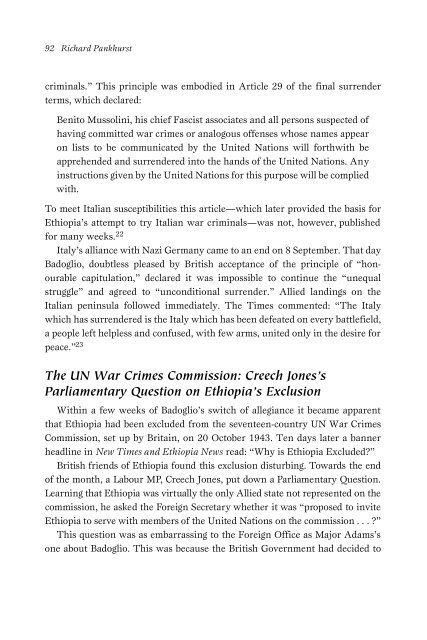Italian Fascist War Crimes in Ethiopia - Societa italiana di storia ...
Italian Fascist War Crimes in Ethiopia - Societa italiana di storia ...
Italian Fascist War Crimes in Ethiopia - Societa italiana di storia ...
Create successful ePaper yourself
Turn your PDF publications into a flip-book with our unique Google optimized e-Paper software.
92 Richard Pankhurst<br />
crim<strong>in</strong>als.” This pr<strong>in</strong>ciple was embo<strong>di</strong>ed <strong>in</strong> Article 29 of the f<strong>in</strong>al surrender<br />
terms, which declared:<br />
Benito Mussol<strong>in</strong>i, his chief <strong>Fascist</strong> associates and all persons suspected of<br />
hav<strong>in</strong>g committed war crimes or analogous offenses whose names appear<br />
on lists to be communicated by the United Nations will forthwith be<br />
apprehended and surrendered <strong>in</strong>to the hands of the United Nations. Any<br />
<strong>in</strong>structions given by the United Nations for this purpose will be complied<br />
with.<br />
To meet <strong>Italian</strong> susceptibilities this article—which later provided the basis for<br />
<strong>Ethiopia</strong>’s attempt to try <strong>Italian</strong> war crim<strong>in</strong>als—was not, however, published<br />
for many weeks. 22<br />
Italy’s alliance with Nazi Germany came to an end on 8 September. That day<br />
Badoglio, doubtless pleased by British acceptance of the pr<strong>in</strong>ciple of “honourable<br />
capitulation,” declared it was impossible to cont<strong>in</strong>ue the “unequal<br />
struggle” and agreed to “uncon<strong>di</strong>tional surrender.” Allied land<strong>in</strong>gs on the<br />
<strong>Italian</strong> pen<strong>in</strong>sula followed imme<strong>di</strong>ately. The Times commented: “The Italy<br />
which has surrendered is the Italy which has been defeated on every battlefield,<br />
a people left helpless and confused, with few arms, united only <strong>in</strong> the desire for<br />
peace.” 23<br />
The UN <strong>War</strong> <strong>Crimes</strong> Commission: Creech Jones’s<br />
Parliamentary Question on <strong>Ethiopia</strong>’s Exclusion<br />
With<strong>in</strong> a few weeks of Badoglio’s switch of allegiance it became apparent<br />
that <strong>Ethiopia</strong> had been excluded from the seventeen-country UN <strong>War</strong> <strong>Crimes</strong><br />
Commission, set up by Brita<strong>in</strong>, on 20 October 1943. Ten days later a banner<br />
headl<strong>in</strong>e <strong>in</strong> New Times and <strong>Ethiopia</strong> News read: “Why is <strong>Ethiopia</strong> Excluded?”<br />
British friends of <strong>Ethiopia</strong> found this exclusion <strong>di</strong>sturb<strong>in</strong>g. Towa rds the end<br />
of the month, a Labour MP, Creech Jones, put down a Parliamentary Question.<br />
Learn<strong>in</strong>g that <strong>Ethiopia</strong> was virtually the only Allied state not re p resented on the<br />
commission, he asked the Fo reign Secretary whether it was “proposed to <strong>in</strong>vite<br />
<strong>Ethiopia</strong> to serve with members of the United Nations on the commission . . . ?”<br />
This question was as embarrass<strong>in</strong>g to the Foreign Office as Major Adams’s<br />
one about Badoglio. This was because the British Government had decided to

















